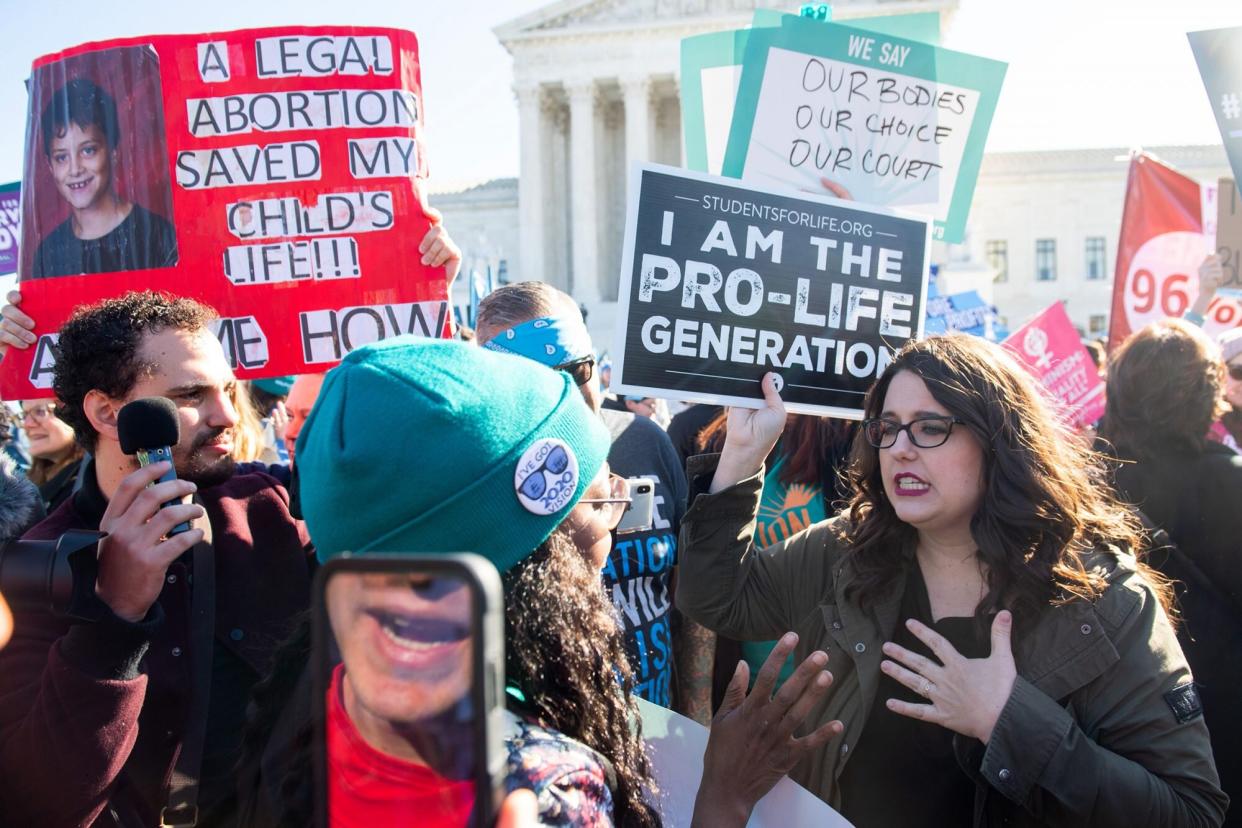Supreme Court Won't Block Highly Restrictive Texas Abortion Law After Delay

- Oops!Something went wrong.Please try again later.
SAUL LOEB/AFP via Getty Anti-abortion protesters and pro-choice activists clash outside the Supreme Court
The Supreme Court voted not to block a highly restrictive Texas law that bans abortions after six weeks of pregnancy, allowing the law to remain in place for now.
Abortion providers in Texas had asked the Supreme Court to issue an emergency block on the law before it went into effect Tuesday after midnight. A day later, the court voted 5 to 4 against the emergency request, with Chief Justice John Roberts joining the three liberal justices in dissent.
With their decision, abortions after six weeks of pregnancy — before many women know they are pregnant — are banned in the state, making it the most restrictive abortion law in the country and essentially eliminating the rights established in Roe v. Wade.
Under the law, private citizens can also sue abortion providers whom they suspect illegally performed an abortion after six weeks or anyone who aided in an abortion, including driving someone to a clinic or helping them with the cost. If the lawsuit is successful, they will be awarded a minimum of $10,000.
The five justices who voted in the majority — Clarence Thomas, Samuel Alito, Neil Gorsuch, Brett Kavanaugh and Amy Coney Barrett — wrote just a single paragraph explaining their decision, which they left unsigned. They argued that the abortion providers who requested the emergency stop on the law did not properly address "complex and novel antecedent procedural questions" about their issues with the law.
"In particular, this order is not based on any conclusion about the constitutionality of Texas's law, and in no way limits other procedurally proper challenges to the Texas law, including in Texas state courts," the justices wrote.
As it stands, the Texas law, known as Senate Bill 8, goes against the Supreme Court's past rulings on abortion, which prohibit states from banning the procedure before fetal viability, which is around 22 to 24 weeks of pregnancy. Texas is getting around that by allowing private citizens to sue abortion providers rather than the state. The Court is expected to take up Texas and other states' challenges to Roe v. Wade when they're back in session in October.
RELATED VIDEO: 'I Pray for All ... Who Will Suffer': Many Stars Are Outraged at Sweeping Alabama Abortion Ban
Roberts wrote in his dissent of the decision that the "statutory scheme" where private citizens sue abortion providers is "not only unusual, but unprecedented."
"The legislature has imposed a prohibition on abortions after roughly six weeks, and then essentially delegated enforcement of that prohibition to the populace at large. The desired consequence appears to be to insulate the state from responsibility for implementing and enforcing the regulatory regime."
RELATED: 27 Celebrities Who Have Shared Their Abortion Stories to Help Women Feel Less Alone
In her dissent, Justice Sonia Sotomayor strongly criticized the Texas law and the conservative justices on the Court for upholding it.
"The court's order is stunning," Sotomayor wrote. "Presented with an application to enjoin a flagrantly unconstitutional law engineered to prohibit women from exercising their constitutional rights and evade judicial scrutiny, a majority of justices have opted to bury their heads in the sand … Because the court's failure to act rewards tactics designed to avoid judicial review and inflicts significant harm on the applicants and on women seeking abortions in Texas, I dissent."
After the law went into effect on Wednesday, President Joe Biden said that it "blatantly violates the constitutional right established under Roe v. Wade and upheld as precedent for nearly half a century."
The law will "significantly impair women's access to the health care they need, particularly for communities of color and individuals with low incomes," he continued. "And, outrageously, it deputizes private citizens to bring lawsuits against anyone who they believe has helped another person get an abortion, which might even include family members, health care workers, front desk staff at a health care clinic, or strangers with no connection to the individual."

